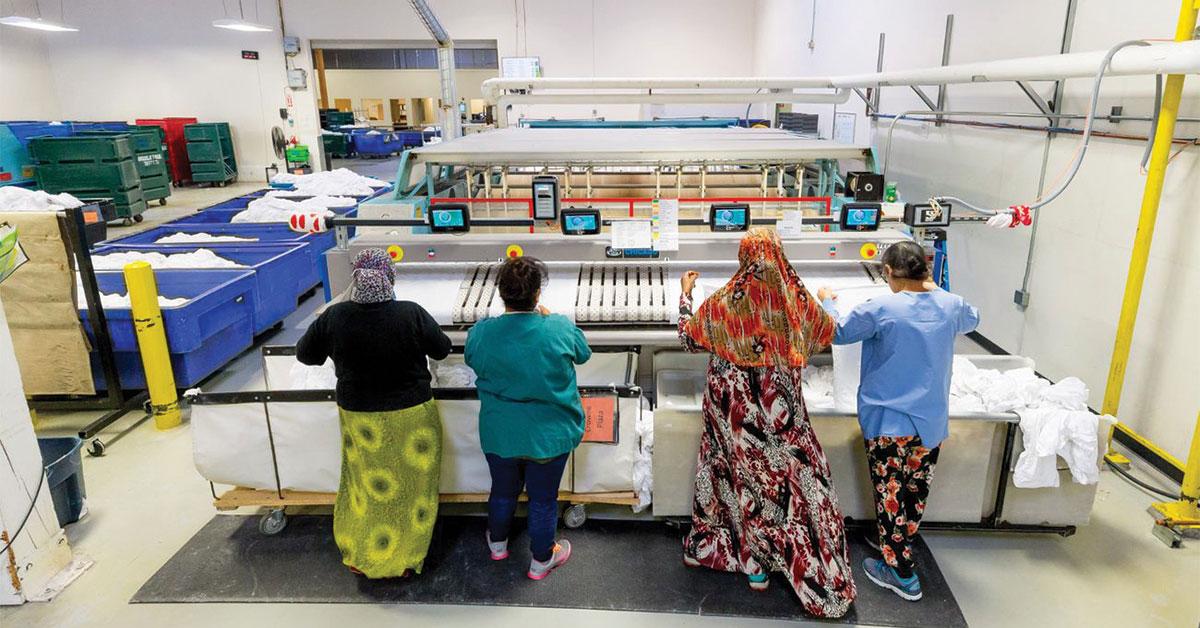KENT, Wash. — In 1965, three mothers who had children with developmental disabilities wanted to ensure their children were educated.
At the time, developmentally challenged children were usually placed in an institution.
In order to ensure that education, the Northwest Center was created here.
“[The mothers] demanded that every child deserves an education,” shares Tod Steward, communications specialist for Northwest Center. “So, in 1971, they got together with the governor and passed House Bill 90 that in Washington state gives every child the right to an education.”
Steward says the movement went national, and in 1975, President Gerald Ford signed the Education for All Handicapped Children Act into law to give every child in the United States the right to an education.
“So, in essence, Northwest Center has affected every single area of the country,” he adds.
The education at Northwest Center isn’t limited to classroom learning. It also owns eight businesses that offer people with disabilities jobs and job experience.
One of those businesses is Puget Sound Laundry Services, which started in 1994.
“It’s a viable business, and it’s a business that we can have people of all abilities work in,” says Tom Niemi, customer account manager for Puget Sound Laundry. “Not all of our employees are what we refer to as all-abilities employees, but somewhere in the neighborhood of, overall, about 50% of them are.”
LAUNDRY BUSINESS
Ofelia Almanza, operations manager, says Puget Sound Laundry’s plant is about 50,000 square feet, using one tunnel plus conventional washers.
“Our total capacity is 150 pounds per load,” she says.
On the drying/finishing side, Puget Sound Laundry uses conventional dryers, three ironers, six small-piece folders and a folding station.
“Last year, we processed 11 million pounds, and we’re expecting to process 13 million pounds this year,” Almanza shares.
She says that Puget Sound Laundry’s product mix is 82% hotel and 18% healthcare, serving hospitals, the military and medium to large hotels in the central Puget Sound region.
“We target medium to large hotels, and we focus on the geographic area, just because it makes sense as far as delivery because we do pick up and deliver the laundry,” shares Niemi. “So being in a relatively small area, a 25-mile radius is quite advantageous for us.”
He says the laundry uses a semitractor-trailer to deliver healthcare goods and three smaller vehicles, two around 28-feet and an 18-foot vehicle, for other goods. One of the laundry’s biggest challenges is retaining truck drivers, Niemi adds.
“We’re a seven-day operation laundry, and we have three shifts,” says Almanza. “We process the Madigan Hospital, and that’s our second shift to process all that. Then the hotel shift is morning, and they start soil at midnight.”
PEOPLE
The goods are processed by 113 employees, of which, as Niemi says, more than 50% are disabled.
“We’ve had people of all abilities work with us since the start-up of the laundry, and we’ve been here for 24 years now,” Almanza shares. “Of course, they know a lot about the laundry, and they can work in practically every area of the laundry.”
She says Puget Sound Laundry works hard at having its employees know how to work every position in the plant.
“It’s not always the case, all of the time,” shares Almanza. “Some people of all abilities can only learn certain stuff, but that is the goal.”
Niemi agrees that a major success for the laundry is “employing people of all abilities and having some of them work here for over 20 years and then being able to operate our tunnel system, which is not an easy system to operate.”
He shares that one employee of all abilities has been at Puget Sound Laundry 17 years, and she is able to work in every area of the building.
“We actually have a software system where we track their productivity, and we began giving out recognition to our people,” Niemi says. “She was recognized this past month of May because she produces more than everyone else.”
Almanza says that all-abilities employees often come into the position with a coach, and the coach might stay as long as six months.
“Sometimes a coach stays here for only a couple of days,” she points out. “It depends on the need of the individual.”
Also, at least two supervisors are on the plant floor at all times. Every effort is made to be able to communicate with and educate all-abilities employees.
“We have a lot of visual cues,” Niemi says. “For example, our PPE; these are all visual. Every area has a board that tells you exactly what PPE you need based on a picture. We make everything as visual as possible and that has helped us a lot.”
Another example he offers is labeling. The hotels the laundry services are all labeled with the name of the hotel, a number and a color.
“One of the first things the Ofelia told me when I started here was that we always managed to be able to find a way to communicate no matter what the situation, and that certainly is true,” Niemi points out.
“We have folks who are deaf who never learned American Sign Language, and you find out how to be able to communicate with them just as effectively as with anyone
else.”
And the effort Puget Sound Laundry makes is working. Almanza says employees are happy to come to work, sharing that many of their all-abilities employees show up to work at least an hour before their shifts.
“We have a lot of them that maybe don’t speak but their parents will let us know whenever they can’t come to work, like a snow day or they’re sick, and they can’t physically come to work. They’re very sad because they’re not at work,” she says. “I always say that for many of our employees, coming to work is the best part of their day, which is certainly different than for many of us.”
QUALITY
The goal of Puget Sound Laundry is to provide the highest level of quality and service that it can to its customers.
“It’s no secret that we’re not the least expensive laundry out there, but we have many customers that stay with us all the time,” Niemi says. “They know that they can get a better price elsewhere, but they stay with us because level of quality and service.”
“In this area, we’re considered the best,” adds Steward. “There have been hotels that wanted to cut costs, and they came back to us saying ‘you know, you guys are just the best.’ They really appreciate the work that we do for them and how we do it.”
Niemi says Puget Sound Laundry maintains its level of quality and service through constant quality and productivity audits.
“We’re constantly auditing quality, looking at linen coming out, addressing concerns head-on really, dealing very directly with any problems that we find,” he shares.
Almanza adds that the laundry is “very forthright with our customers.”
“We return all the rag-out to them, and I know that with all laundries that might not be the case,” she says.
Of course, Almanza credits the laundry’s employees for maintaining a high level of quality and service.
“We have a strong group of employees that care,” she says. “For example, somebody came in today who’s worked here for about a month now and it was like, ‘You know, I can’t seem to memorize a difference between each hotel.’ Each hotel has something in particular, and she goes home and stresses about that because she’s only been here for a month. Our employees care very much.”
In addition, Puget Sound Laundry is a member of the Healthcare Laundry Accreditation Council (HLAC), processing all laundry to sanitary hospital standards. In addition, it is a member of the Association for Linen Management (ALM), and key management personnel have completed the ALM Certified Laundry & Linen Manager (CLLM) program.
Besides maintaining quality and service in regards to its customers and goods, Puget Sound Laundry is also looking to improve its operations.
“We certainly can add some capacity, probably, going forward, but really I think our challenge, or what we’re looking at now, is becoming more efficient,” says Niemi. “That’s where our growth will come, by becoming more efficient.”
He adds that Puget Sound Laundry is “basic” at this time and is exploring ways to go further with automation in the plant.
“The building is the building,” says Niemi. “We’re not going to take all this stuff out of here or add on to the building. So, we need to be more efficient and use our spaces as effectively as possible, along with our personnel.”
And for Puget Sound Laundry, it always comes back to the employees.
“I think the No. 1 thing is, regardless of who you are, whether you’re affiliated with Northwest Center or you’re not, there are distinct advantages to hiring folks of all abilities,” shares Steward. “They are the people who show up regularly and stick with us more than anyone else.
“There’s an entire population that can do great things for any organization.”
Have a question or comment? E-mail our editor Matt Poe at [email protected].




